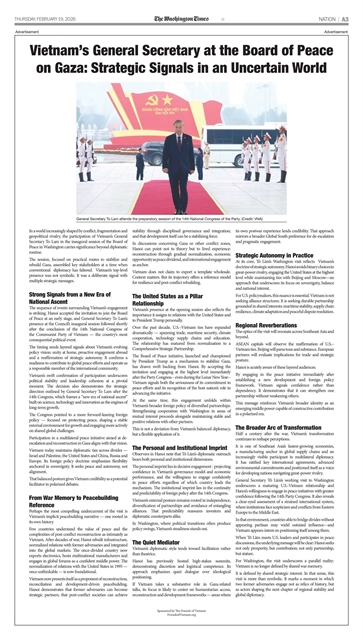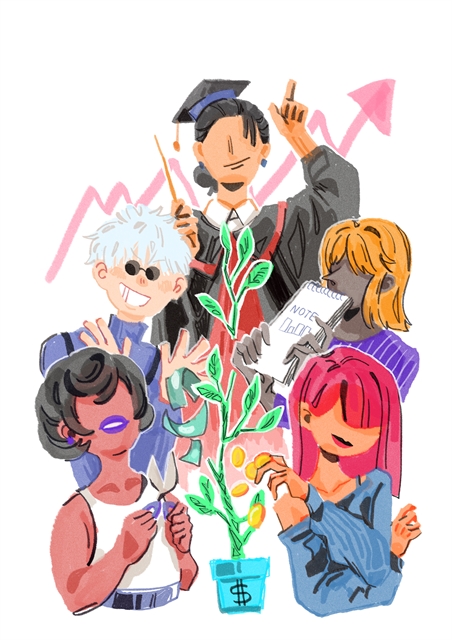 Talk Around Town
Talk Around Town

May is a month of extreme feelings every year: it's farewell to friends, teachers, and school. Students get their summer break and will not see their friends for about 10 weeks, and then they switch to a higher class or a new phase of their lives. Some say goodbye to their adolescence to find a job to support themselves or find a spot at higher education institutions.

|
| Illustration by Chepchep |
by Nguyễn Mỹ Hà
May is a month of extreme feelings every year: it's farewell to friends, teachers, and school. Students get their summer break and will not see their friends for about 10 weeks, and then they switch to a higher class or a new phase of their lives. Some say goodbye to their adolescence to find a job to support themselves or find a spot at higher education institutions.
Việt Nam has a long tradition of favouring education. Parents can always be heard telling their children to focus on studying, or playing and hanging out less so that they can have a better future. Many parents believe their children's only way to succeed in life is to study, to the higher level, the better.
Every year, the race to get your children to a good school in big cities never ends. The pressure, as a result, heightens in higher classes up to college.
Compared to 10 or 20 years ago, today, Việt Nam has more colleges, better schools and more options. Students need not sit the college entrance exams, which used to last for 3 hours each for three subjects in writing tests in unairconditioned rooms in the July heat of 38 or even up to 40 degrees Celsius.
Even if you want to look at the education system with the most critical mind and attitude, you must say that more choices have become available today.
Suppose students do not want to go to public colleges. In that case, they can go to joint programmes where local colleges coordinate with international institutions, and they can study for one year or two abroad and get a joint degree.
This form of training has become favourable to many parents, as the tuition costs less and students get better prepared to study and live on their own abroad.
The most expensive are foreign colleges, where parents have to pay a massive sum of money, and some even send their children to boarding schools for better assimilation to the new environment.
Studying abroad can be very challenging for those who want to learn and live in a new city or country all by themselves. Some became successful, but some fell prey to gambling online, depression, or lose interest in their study and return home.
Among the top students, it's a trend to apply to top colleges in the Ivy League in the United States, Oxbridge in the United Kingdom, and other schools in Europe or Australia.
Last year, due to COVID, many US Standard Assessment Tests in Việt Nam had to be cancelled, thus taking away many chances of top students getting accepted to US top colleges. Many switched to Australia, joint programmes in Việt Nam or took a gap year.
When everyone strives for the highest score of over 1400 on SATs, and it even seems impossible to get to top colleges in the US for US citizens, what makes your application, and you, stand out?
It's a hard question to answer, and you only know what's right when you get an acceptance letter from the school.
Breathing the feverish race for almost a year, I was surprised when I asked a mother whose son got an A* in all three subjects -- Maths, Physics and Chemistry A Level tests. Which school he would go to. I got the most casual answer I've ever heard, "Any school that would accept him."
That was like a wake-up call for me and maybe many other parents. This boy was brilliant in the A-Level tests, but he did it just to know where he was.
He wanted to take SATs to study engineering in the US but could not sit the test due to COVID. His father said: "Hey, if you go to study in the US, it's too far away, and if you get sick, we cannot help you."
Then the boy and his family decided to choose a school in Australia, to be closer to home, and it's where another boy, his high school classmate, would go to college.
It's not just being good enough to get to top schools, but choosing which one you want to go to. It's not that his family cannot afford the throat-cutting tuition of UK colleges, but he wants to be where it's warmer and closer to home. The young man belongs to a generation of youths who is brilliant but doesn't have to be top at all costs.
Another friend's son also decided not to apply for colleges abroad right after high school.
"I had to go to the hospital for treatment during the pandemic. I was touched by how my parents had to arrange work to take care of me, so I want to stay home to enjoy the company of my family a little longer," he said.
"My tests score got me to one of the great universities in Hà Nội, and they have an exchange programme with schools in the US and Japan, so if I work well at college, I can apply to go as a junior student. I'm in no hurry."
Educators and parents agree that when students go abroad to study when they are 20 and more mature, they will focus more on work. But it's harder for them to assimilate to the new society and changes than when they were younger, say 17 or 18 years old.
Even if you get to study in colleges abroad and pass all the necessary tests, you still have to try harder and work double the workload to get to the level of native students.
"My daughter graduated with honours in college and got a master's degree, but when it comes to applying for jobs, she knew that if another native with citizenship also applied for the same job, she would be turned down even if her grades were better," said a mother of three, whose eldest child went to college in the UK.
Life brings unpleasant circumstances at every turn, but you need to accept them, work harder, and overcome the challenges. If you try, then people will want to help you. If you fall and people throw you their hands, and you don't want to grab them, no one can help you.
It's a part of life young people need to know. They also need to know that nothing good comes for free, without sweat and tears. Be a positive active member anywhere you decide to stay. Receiving and giving are two sides of a coin; one cannot only give or just take. VNS